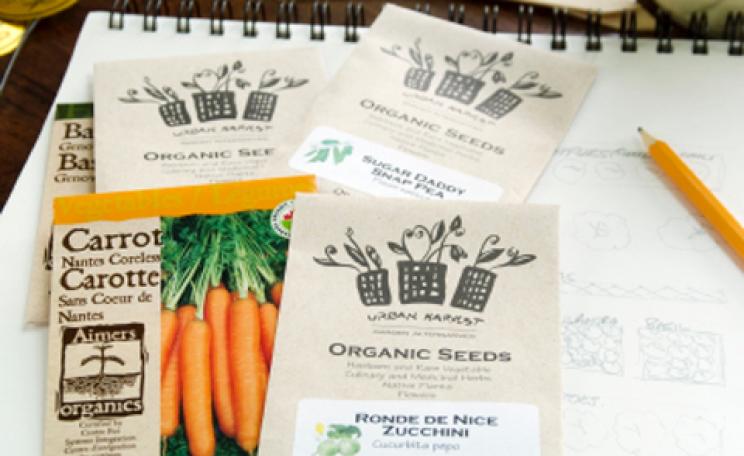Never underestimate the predictability of stupidity. And there’s nothing stupider than making unrealistic promises to yourself in a post Christmas stupor. Promising to quit the fags, lose the flab and drink less is all well and good, but it reeks of knee-jerk sentimentality after the festive excess and as a result, these predictable pledges often fail to make it to February. So what about if you made some resolutions that you were likely to keep, ones that would yield results to be proud of with little effort? Well, the Ecologist has come up with some foodie resolutions that are not only easy to stick to, but will benefit both you and the environment.
Resolution one: Cut down (or ditch) the meat
The standards of British cuisine have improved immeasurably over the last 20 years. Love them or loathe them, celebrity chefs have played their part by bringing ideas and innovation to our kitchens, which had been the laughing stock of Europe for generations. Pubs and restaurants also played their part in the food revolution, ditching the overpriced muck they were once notorious for and opening our palates and minds to new and exciting cuisine. All of which is great news for those thinking about going vegetarian in the New Year. There has never been an easier or tastier time to sans meat than now and there are many benefits from doing so. ‘A well-balanced vegetarian diet is known to bestow a wide range of health benefits,’ says Su Taylor of the Vegetarian Society. ‘Research has shown vegetarians to suffer less heart disease, hypertension, obesity, diabetes, various cancers, diverticular disease, bowel disorders, gall stones, kidney stones, and osteoporosis.’ Vegetarians are also less likely to be obese and tend to have a lower than average body mass index.
 However, ditching meat, or even just cutting back on it, isn’t just beneficial to your health; it can also be good news for the environment. Studies estimate that livestock farming is responsible for 18 per cent of the planet’s greenhouse gas emissions, which is nearly five per cent more than the world’s trains, planes and cars combined. Beef is the biggest offender: producing this woefully inefficient meat requires thousands more litres of water and fossil fuels than it does to produce vegetables, pulses and grains. And lest we forget the ethical benefits of being vegetarian, 2.3 million land animals are slaughtered in the UK everyday and if you’re not contributing to that figure you might eat a little easier. However, aspiring veggies have to tread carefully: foreign made meat substitutes such as quorn, tofu and soya are actually having a devastating impact on the environment with farmers tearing down forests to grow them. Buying British and growing your own is a good way of avoiding these environmentally-unfriendly meat alternatives.
However, ditching meat, or even just cutting back on it, isn’t just beneficial to your health; it can also be good news for the environment. Studies estimate that livestock farming is responsible for 18 per cent of the planet’s greenhouse gas emissions, which is nearly five per cent more than the world’s trains, planes and cars combined. Beef is the biggest offender: producing this woefully inefficient meat requires thousands more litres of water and fossil fuels than it does to produce vegetables, pulses and grains. And lest we forget the ethical benefits of being vegetarian, 2.3 million land animals are slaughtered in the UK everyday and if you’re not contributing to that figure you might eat a little easier. However, aspiring veggies have to tread carefully: foreign made meat substitutes such as quorn, tofu and soya are actually having a devastating impact on the environment with farmers tearing down forests to grow them. Buying British and growing your own is a good way of avoiding these environmentally-unfriendly meat alternatives.
Resolution two: Get green fingered
Thanks to a combination of rising food prices, lower disposable incomes and greater environmental awareness amongst the younger generation, gardening has never been cooler. Demand for allotments and grow-your-own kits has soared over the last 18 months, as green-fingered Brits reach for the seed packets to cultivate their own produce. This Good Life ethos has struck a particular chord with younger crowds, and with 2012 set to be leaner than the last miserable year, a New Year’s resolution to follow suit could be a savvy financial move. ‘I got an allotment last year and I’m really getting into it; I’ve been growing all sorts of stuff on it,’ says Daniel Curtis, a 27-year-old paramedic from Reading. ‘I’ve noticed more people of my age growing their own things, which is great. I love it; it’s therapeutic, it gets you outside and it is satisfying eating food you’ve grown yourself. It has also saved me a fair few quid.’ By cultivating their own produce, home growers are also significantly reducing the miles food has to travel to the table, which is great news for the environment. Even if you don’t have a garden or an allotment, you can grow the following produce on windowsills and in hanging baskets.
Herbs
Basil, coriander, parsley and other herbs can all be grown in small pots on windowsills. They need very little care, yet add so much flavour to your food.
Tomatoes
Tumbling tomatoes can be planted with compost in hanging baskets. They require little more than sunlight and regular feeding.
Chili peppers
To grow chilies all you need is a warm windowsill that gets direct sunlight. The plants themselves look great and when the fruit is ripe it will spice up your food life.
Salad
Lettuce, rocket and other edible plants grow well in a window boxes and hanging baskets. Not only are they are fast growers; they require little care and will make the freshest salad you’re ever likely to eat.
Resolution three: Buy local
It’s easy to get in the habit of doing your weekly shop in the supermarket but your blinkered walks down their familiar aisles could be costing you money. These big shops might seem like your friends with two-for-ones and bogofs, but their loss leaders (everyday goods sold at a loss to get consumers inside) and psychological pricing can mean, overall, you’re paying more than you should be at the tills. A New Year’s resolution to buy from butchers, bakers, greengrocers and farmers markets can save you packets. And it’s not just good news for your wallet; the cash you do spend is going back into the local economy, rather than the pockets of shareholders thousands of miles away. The reduction in food miles is also a major benefit for the environment.
 Resolution four: Go organic
Resolution four: Go organic
Don’t pretend you can taste the difference between an organic spud and its naughty, non-organic equivalent. You can’t. But to go organic in a quest for flavour is missing the point because the benefits of eating au naturel go well beyond that of the palate. While nobody can agree on the health benefits of organic produce, those that make the switch can enjoy their food safe in the knowledge that it hasn’t been sprayed with chemicals. Admittedly, buying organic is more expensive but if you can afford it then you will be helping the planet and the economy.
According to the Soil Association, to produce just one tonne of nitrogen fertiliser takes one tonne of oil and 100 tonnes of water and produces seven tonnes of greenhouse gasses in the process – no such issues with organic farming. The Government has also discovered that plant, insect and bird life on organic farms is around 50 per cent greater than on non-organic equivalents. ‘Organic farming actually relies on wildlife to help control natural pests,’ says Clio Turton from the Soil Association. ‘Wild field edges are left uncultivated for bugs, birds and bees to flourish.’ Then there are the economic benefits. According to a study carried out by the University of Essex, organic farming in the UK provides 32 per cent more jobs per farm than equivalent non-organic farms. ‘If all farming in the UK became organic over 93,000 new jobs directly employed on farms would be created,’ explains Clio. To put that in context, that is about 16 times more people than were employed by Rover when it closed in April 2005. ‘Organic food is good for you and your planet,’ says Clio. ‘It allows us make a big difference.’
Resolution recipe
If you’re inspired enough to take on these New Year’s resolutions, then make a tasty start with this recipe from the Vegetarian Society
Mushroom Filo Pie with Spicy Peach Coulis
For the pie:
4 tbsp olive oil and extra to brush
3 onions, chopped
4 large leeks, chopped
1.5kg mushrooms, chopped
3 tbsp fresh oregano, chopped
450g cooked white rice
salt and freshly ground black pepper
12 large sheets filo pastry
2 tbsp olive oil
For the coulis:
2 onions, finely chopped
3 tbsp mild curry powder
675g peach chutney
180ml water
- Preheat the oven to 220C°/425F°/Gas 7. In a large pan, heat the olive oil and sweat the onions, leeks and mushrooms until tender. Stir in the fresh oregano and cooked white rice and season to taste.
- Take two large roasting pans and layer three sheets of filo pastry in each one, brushing with olive oil between each layer.
- Put half the leek and mushroom filling into each dish and cover with three more layers of oiled filo pastry.
- Place in the oven for 15 to 20 minutes until the pastry is golden brown. Reduce the heat after 10 minutes if getting too brown.
- Meanwhile make the coulis: Gently fry the onions in the oil until tender, add the curry powder and cook for two minutes, stirring all the time. Add the chutney and water and heat through gently. Blend until smooth.
- The filo pie goes well with a crisp green salad or new potatoes and steamed broccoli. Don’t forget to drizzle a little peach coulis over the dish before serving.
| READ MORE... | |
 |
GREEN LIVING Leftovers: the ultimate guide Pile of leftover turkey driving you crazy? Here's our guide to dealing with it the eco-friendly way |
 |
GREEN LIVING Wine: how green is your glass? Certification is expensive and monitoring of ingredients can be difficult so it can be hard for consumers to make an informed choice about wine. Sophie Laggan takes a look at the options |
 |
GREEN LIVING Starved to death: are high protein diets killing the planet? From the Atkins to the Dukan, protein-based diets are big news in the celebrity world. But what effect is our love affair with meat, fish and cheese having on the environment? |
 |
GREEN LIVING Snack on that! Are insects the future of food? With seven billion people to feed, agriculture is feeling the strain. So are creepie crawlies the solution? The Ecologist takes a closer look |
 |
GREEN LIVING Ten of the best…farm shops Offering the ultimate in locally produced food, Britain's farm shops are a culinary national treasure |








